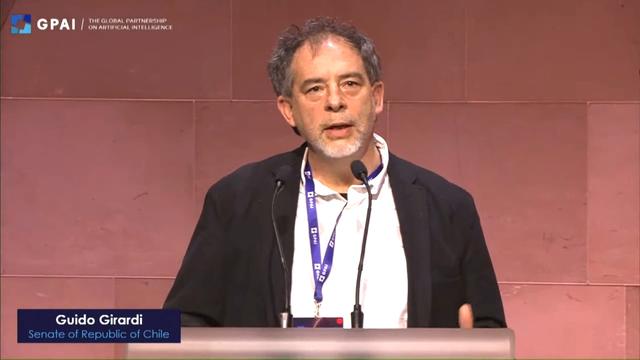Girardi explained the Neurorights Law at a world meeting on artificial intelligence - El Mostrador
Senator Guido Girardi, president of the Future Challenges Commission of the Chilean Senate, was "the special guest" at the Second Plenary Meeting of Experts organized by the Global Association on Artificial Intelligence (GPAI), which brings together 18 countries from the European Union and whose goal is to "bridge the gap between AI theory and practice."
The meeting takes place in Paris, (November 11 and 12), with the participation of world-renowned personalities on the subject and the President of France, Emmanuel Macron, was also present.
Senator Girardi presented, at noon this Thursday, the pioneering Chilean legislative experience in creating and protecting neurorights, as well as regulating neurotechnologies and digital platforms.
risks
The Chilean parliamentarian explained that he met the neurobiologist Rafael Yuste -coordinator of the Brian project to unravel the wiring of the human brain- as a speaker at a Future Congress and that he "alerted us of the risks associated with neurotechnologies as they could already read directly in the brains emotions, thoughts and the unconscious”.
He added that “the urgency of establishing neuro rights is due to the fact that, in the 21st century, the fuel that will determine geopolitics - like oil in the 20th century - is data. The engines that move the economy and society are the algorithms and they are developed from the data and knowledge of the wiring of the human brain”.

“Whoever controls artificial intelligence will have unstoppable political, economic, social, cultural and military power. The geopolitical dispute of the 21st century is for the control of data, of AI and the hegemony of cyberspace”.
New regulatory framework
He said that "for this reason, together with the Academy of Sciences of Chile, the universities of my country and Rafael Yuste, we set ourselves the challenge of updating the regulatory framework for the 21st century with a constitutional reform that modifies the Fundamental Charter, to establish the scientific development and Technology at the service of people.
He explained that the initiative "associates brain activity and the information from it, to the physical and mental integrity of the person as a right (...) allows restrictions to be established for the protection of brain activity (...) within the framework of a fundamental right and under the principle of constitutional supremacy, which obliges the rest of the regulations to adjust to said precepts and, the operators, to guarantee their compliance in order to maintain the rule of law”.
He also referred to the project that regulates neurotechnologies "establishes that submission to any use of neurotechnologies must be consented and defines special requirements to determine its existence: be free, prior, informed and expressly, explicitly and specifically verified."
As well as digital platforms, “the law establishes the duty of neutrality of platforms as a general rule and guarantees the freedom of expression of its users, establishing as a limit the infringement of the rights of others. As an exceptional rule, it recognizes the ability to edit the content, cases in which it makes the platform responsible.”
